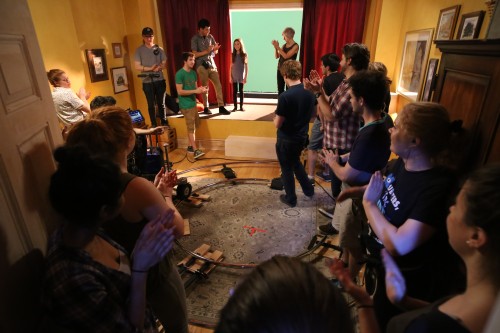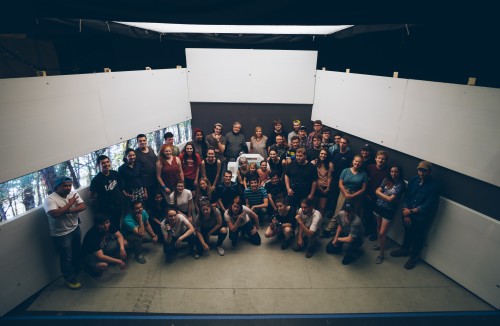
In September, a crew of over 60 plans will finish production for “CXL,” a short film directed and produced by DePaul students that focus on growing technology, immortality and generational gaps.
The plot follows 140-year-old Martha as she considers ending her life after the death of her husband, despite the thriving world around her and the presence of multiple generations of her descendants. Modern medicine and a life support chair enable her longevity.
Director, Jordan Blazak, used the idea in his film after an in-depth conversation with his uncle over the increased abilities of technology and longer lifespans of the future.
“We were talking about crazy realities like 3D printers that allow for 3D organs like lungs,” Blazak said, “and I wondered how far will that go before we’re reprinted with a new body. I took that idea and applied it to having an expanded life expectancy in our generation.”
“CXL” translates to “140” from Roman numerals and represents an exaggerated life expectancy – a number that Blazak considers nestled between the humane side of a long life and the tipping point of choosing death experiencing all life has to offer.
Producer, Anna Powers, said that the film focuses on the sanctity of life and appreciation of friends and family.
“There are always generation gaps in families,” Powers said. “But this film shows the importance of taking an effort to bridge those gaps, even if in tiny ways, in order to love and understand those around you better.”
Producer, Amy Baker, was drawn to the sophistication the script and its particular approach to science fiction.
“Science fiction tens to be synonymous with action,” Baker said, “but this film veers more towards drama. It deals with the human element and psychological drama that would come from development of new age technology.”

Blazak wanted to challenge everyone involved, and emphasized his desire to go beyond the restrictions common in student films. Baker said those restrictions or challenges may include insurance, financing, equipment and location.
For example, “CXL” uses anamorphic lenses instead of the spherical lenses common in student films. Anamorphic lenses, used mainly in Hollywood films, stretch the image widescreen and challenge cinematographers to frame shots differently.
Another piece of equipment used was a techno crane, a 22-foot-tall remote control crane with a camera at the end. The crane allows for filming and swinging above the actors. Blazak thinks it may be the first time a DePaul film has used a techno crane.
“I want us as a team to tear down the walls of what’s possible,” Blazak said, “and I think the production value is what will set it aside and make it stand out.”
The large crew involved in the film is what made the film most difficult to create, but Blazak, Baker and Powers all agree that the experience was the most rewarding part of the process.
“With the futuristic setting of the film we knew immediately that it was going to be a challenging film that required a lot of attention to detail in all departments,” Powers said, “so this movie required a large crew all with specific skill sets.”
It was filmed primarily at CineSpace Chicago Film Studios, where other productions such as “Chicago Fire” and “Chicago P.D.” are filmed, and had on-location filming at Chez-Chicago Event Space.
Blazak said DePaul has been incredible through the process. “There are countless resources provided to students that allow them to make movies even as early as freshman,” he said, citing high quality cameras and CineSpace as examples. “Why not take advantage of all those things that DePaul offers?”
“CXL” is currently in post-production, and will be submitted to festivals that typically last about a year before the crew releases it online publically. The crew plans on submitting it to Sundance Film Festival, South by Southwest, Toronto International Film Festival and Tribeca Film Festival, as well as other local and genre-specific film festivals.
While “CXL” is a project rooted in DePaul’s School of Cinematic Arts, it also serves as collaboration with Columbia College and Tribeca Flashpoint Academy.
“We do have a lot more to go, such as adding music, putting the color and other sound final touches,” Baker said, “but it will be so satisfying, seeing the culmination of it all – ten months of really intense work on one project.”
“Nothing feels better than being on one big team all supporting one another to reach one unifying goal – make the best film possible,” Powers said. “That’s why I love my job and this line of work.”
“CXL” has an Indiegogo donation page linked to its social media profiles where donors can support paying for festival submission prices, music acquisition and other costs of post-production.

